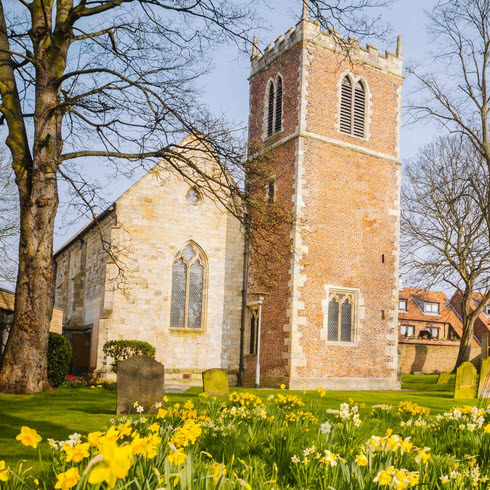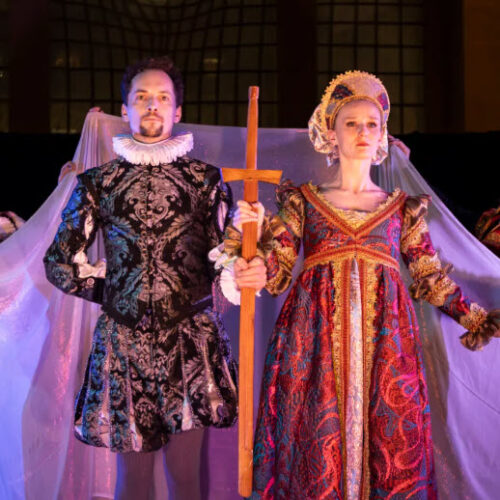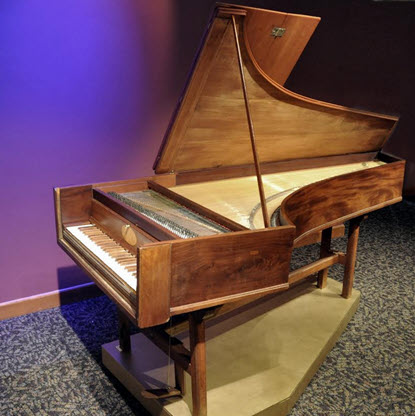by
Published May 28, 2019
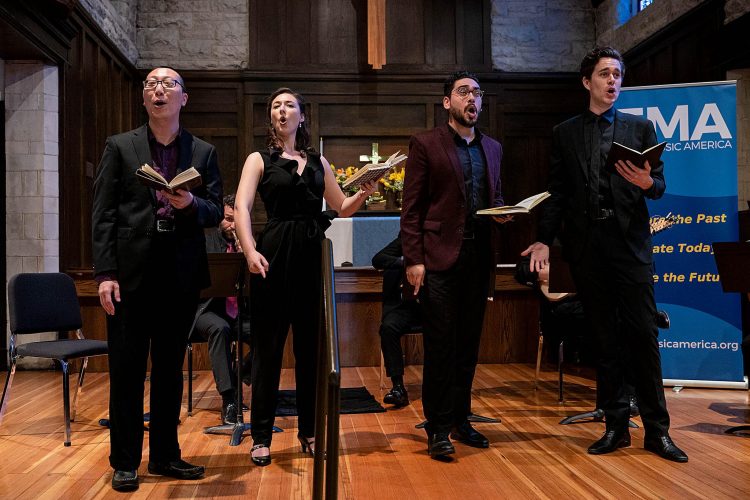
Penned by King Henry VII during a period of extravagance and exuberance, the song “Pastime with Good Company” sends the message that spending time with others is morally preferable to idleness. Performed as the final work of the USC Thornton Collegium Ensemble’s performance at this year’s Young Performers Festival and Emerging Artists Showcase, it could stand for the entire three-day period, as there was no time to be idle, and multiple opportunities to spend time in good company! Indeed, the informal theme of EMA’s 2019 festival, which ran May 22-24 in Bloomington, IN, turned out to be creating meaningful connections.
As with a series of matryoshka dolls, EMA’s festival was nested inside the Bloomington Early Music Festival (BLEMF), with each concert revealing the breadth and depth of early music study throughout North America. Now in its 26th year, BLEMF was founded by Stanley Ritchie, distinguished professor of music in baroque violin and early music at IU Jacobs School of Music’s Historical Performance Institute. He is still an ever-present figure at the festival.
Founded in 2010 by Lyle Nordstrom, who coincidentally was the 2019 recipient of the Howard Mayer Brown Award (more on that later), the YPF was created as an annual event by EMA for college-level early music ensembles to play with and for each other, and for the local community. For the first seven years, the festival alternated between the Boston and Berkeley early music festivals moving in 2018 to Bloomington, home to both BLEMF and IU’s Historical Performance Institute, headed by EMA board member Dana Marsh.
It seemed appropriate that EMA should present the festival in the state of Indiana, often dubbed the nation’s thoroughfare, and with the HPI one of North America’s largest early music programs. The smaller college town offered the opportunity to more easily create meaningful connections between the musicians, and the policy of free concert admission and year-round outreach to the community meant large and eager audiences. Building on the success of the first partnership between EMA, BLEMF, and the HPI last year, EMA’s 2019 festival was further embedded into Bloomington’s musical life, with the majority of events taking place in downtown venues, all within easy walking distance of each other.
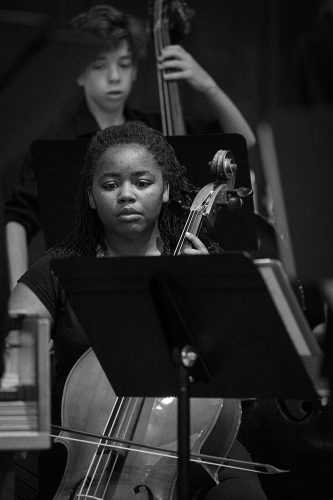
Besides USC Thornton’s Collegium Ensemble’s eighth appearance at the Young Performers Festival in a program of music from the shores of England and France, the other four concerts in the YPF were presented by ensembles from Oberlin Conservatory, McGill University’s Schulich School of Music, the Peabody Conservatory of Johns Hopkins University, and The Brandenburg Project, from the Community Music School of Ann Arbor. The first four are well known in the field for their long-standing programs in historical performance, the latter a remarkable group of middle- and high-school aged students who made the transition to historical instruments and bows only a year ago. Each concert had its own highlights, unfolding over an hour and taking us to worlds distant in time and place. McGill presented “La Morte di Lucretia” by Monteclair and Peabody a series of portraits of far-off worlds. The Brandenburg Project gave a thrilling performance of three movements from Pergolesi’s Stabat Mater, and one of the Oberlin musicians performed – brilliantly – Dario Castello’s Sonata Prima only five days after an appendectomy. A harp string snapped, loudly, during one concert, and audiences were uniformly large and enthusiastic.
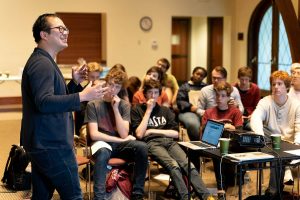
All the participants came together on two mornings to work with EMA board members Emily Lau, Gary Payne, and Derek Tam, who led interactive conversations on relationship-building, photography, and personal finance and tax, respectively. David Wood, EMA’s special projects & marketing coordinator, talked about social media. The conversations included the musicians in EMA’s Emerging Artists Showcase, which was launched in Bloomington last year and designed as a stepping stone for musicians no longer enrolled in college programs. The first of the two concerts, intended for emerging musicians to explore how to present their own recitals in a compelling way, paired soloists Joyce Chen (harpsichord) and Vincent Lauzer (recorders).
Joyce Chen is originally from Taiwan and discovered harpsichord with Davitt Maroney at UC Berkeley while studying Mechanical Engineering. Now studying for a PhD at Princeton in historical musicology, she channeled her inner Italian (her own words) in a program of Frescobaldi, Rossi, Storace, and Poglietti. The impish Vincent Lauzer is from Montreal, where he studied with Matthias Maute at McGill. Already establishing a career in Canada, this was only his second appearance in the US.
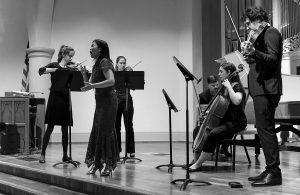
The second Showcase was by Aperi Animam, a vocal ensemble who brought its Milwaukee-based modern approach to English Tudor choral music, and the Rezonance Baroque Ensemble, from Toronto, making its US debut with a passionate and dramatic series of arias from Handel operas sung by the soprano Vania Chan. (Kailey Richards, one of their violinists, received her undergraduate degree in baroque violin from IU, studying with Stanley Ritchie, and it was nice to see them reunite.)
All the musicians talked to the audience and every performance was livestreamed to thousands of others around the globe. Every concert brought a new earworm only replaced by the next concert!
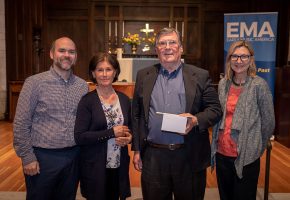
EMA owes a great deal to the people who laid the groundwork for the Young Performers Festival and Emerging Artists Showcase. This is one of the reasons it makes annual awards to those who have created the landscape in which early music can flourish. The 2019 Howard Mayer Brown Award for lifetime achievement in early music was awarded to Lyle Nordstrom, who has spent his career nurturing hundreds of students who are now active performers, through his work at Oakland University (MI), Clayton College (GA), and the University of North Texas. In what was meant to be his retirement, Lyle and his wife, Pat, established Mountainside Baroque and Summer Music Academy in Cumberland, MD.
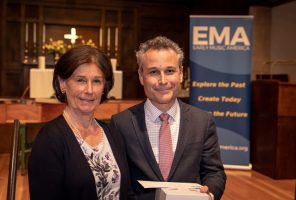
Eric Rice was awarded the 2019 Thomas Binkley Award for outstanding achievement in performance and scholarship by the director of a university or college early music ensemble. Binkley was the first director of the HPI (then the Early Music Institute) and his widow, Raglind Binkley, presented both awards, keeping Binkley’s spirit alive to this day.
There were mishaps, of course – flight cancellations, parking tickets, unloading instruments in torrential rain – all handled with that inimitable festival mix of adrenaline and exhaustion. The day before the festival began, it was too cold to be outside. The day after it ended, it was too warm. Lightning storms, power outages, and torrential rain all added to the powerful need to be together, so there was no question that these few days really felt like a festival and not simply a string of concerts.
As the African proverb puts it so well, it takes a village to create the Young Performers Festival and Emerging Artists Showcase. EMA is grateful to Dana Marsh and IU’s Historical Performance Institute, the Bloomington Early Music Festival, directed by Alain Barker, to Leighann Daihl Ragusa for organizing homestays, and to Paulina Francisco and Adam Dillon, and the many, many more who made the festival possible. Special thanks to the board of directors of Early Music America, who enthusiastically supported the venture.
-Karin Brookes, Executive Director, Early Music America

